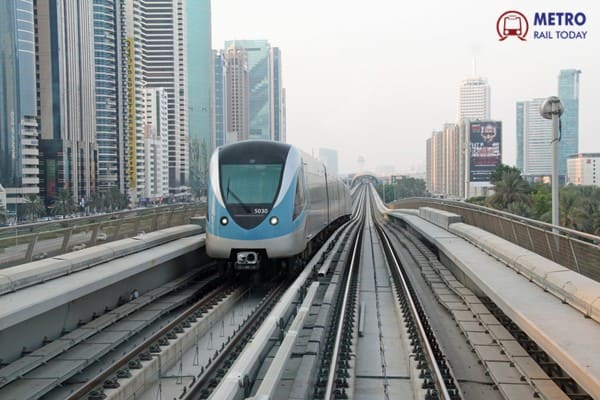
Dubai, UAE (Metro Rail Today): In a groundbreaking move toward modernizing urban maintenance, Dubai’s Roads and Transport Authority (RTA), in collaboration with Keolis MHI, the operator of Dubai Metro and Tram, has initiated the implementation of an innovative drone-powered cleaning system specifically designed for metro and tram station façades across the city. This advancement marks a significant shift in how urban infrastructure is maintained, streamlining processes that were once labor-intensive.
This forward-thinking initiative replaces traditional cleaning methods, which previously needed a workforce of up to 15 workers per station. Thanks to the introduction of drone technology, this figure has been dramatically reduced to just eight personnel, leading to an impressive decrease in manpower requirements by over 50%. More than just a numbers game, this shift enhances worker safety significantly, as it minimizes exposure to the hazardous conditions often associated with high-elevation cleaning tasks.
“This pilot initiative reflects RTA’s commitment to adopting innovative technologies that enhance safety, optimise resources, and support Dubai’s sustainability goals,” said Mohammed Al Ameeri, Director of Maintenance at RTA’s Rail Agency.
Smart, Sustainable and Safe
The introduction of drone technology is not merely about efficiency; it also incorporates essential sustainability and safety advantages that resonate with Dubai’s long-term green objectives. One of the critical benefits of utilizing drones is their reduced water consumption per station, which plays a crucial role in lessening the environmental footprint associated with traditional cleaning operations. This is a leap forward in RTA’s ongoing pursuit of a greener, more sustainable approach to urban infrastructure maintenance.
“Our partnership with Keolis MHI is helping drive the development of automated solutions that enable safer, more sustainable infrastructure maintenance,” Al Ameeri added.
Initial trial results have shown that routine façade cleaning can be performed significantly more efficiently using drones. While traditional methods will still be preferred for intricate detailing, the drone system presents a compelling foundation for developing a hybrid model that merges manual precision with the advantages of automated efficiency.
Supporting Dubai’s Smart City Vision
Vikas Sardana, Chief Operating Officer at Keolis MHI, highlighted the broader implications of this initiative: “We are proud to support RTA’s strategic vision and Dubai’s transformation into a smart, sustainable city. This trial embodies our belief that innovation starts with curiosity and courage.”
He further stated that this initiative is in alignment with Dubai’s Clean Energy Strategy 2050 and the Smart Dubai initiative, thereby reinforcing the city’s ambition to cement its status as a global leader in smart mobility and sustainable infrastructure. This synergy of goals indicates a shared commitment to integrating technology with ecological responsibility across urban development.
Key Benefits of Drone-Based Façade Cleaning:
-
Over 50% reduction in manpower requirements, enhancing operational efficiency.
-
Increased worker safety by minimizing exposure to high-risk, elevated tasks.
-
Lower water consumption, contributing to environmental sustainability initiatives.
-
A strong foundation for future hybrid cleaning models that combine automation with manual tasks.
-
Accelerated progress toward achieving Dubai’s smart and sustainable city objectives.
As Dubai continues to advance as a pinnacle of smart city development, pioneering innovations like drone-powered maintenance illustrate the unwavering dedication of RTA and Keolis MHI toward cultivating a resilient, efficient, and sustainable urban mobility landscape.

